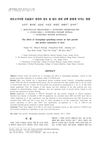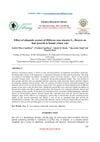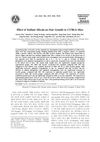 7 citations,
July 2018 in “Journal of Functional Biomaterials”
7 citations,
July 2018 in “Journal of Functional Biomaterials” A new anti-baldness patch effectively treats hair loss by blocking enzymes linked to the condition.
 7 citations,
August 2017 in “PloS one”
7 citations,
August 2017 in “PloS one” Key genes linked to hair growth and cancer were identified in hairless mice.
 7 citations,
January 2017 in “Skin Pharmacology and Physiology”
7 citations,
January 2017 in “Skin Pharmacology and Physiology” ECOHAIR® lotion is effective and safe for improving hair growth and reducing hair loss.
 7 citations,
June 2015 in “Cutaneous and Ocular Toxicology”
7 citations,
June 2015 in “Cutaneous and Ocular Toxicology” Some drugs can cause skin reactions, which may improve when the drug is stopped, and rapid diagnosis and stopping the drug is crucial.
 7 citations,
February 2013 in “Tropical Journal of Pharmaceutical Research”
7 citations,
February 2013 in “Tropical Journal of Pharmaceutical Research” Licorice root extract may promote hair growth in female rats.
 6 citations,
April 2017 in “Frontiers in Pharmacology”
6 citations,
April 2017 in “Frontiers in Pharmacology” Chinese medicine may help treat hair loss by affecting genes and enzyme activity.
 6 citations,
January 2017 in “Annals of Dermatology”
6 citations,
January 2017 in “Annals of Dermatology” Combination of 17α-estradiol and minoxidil improves hair growth and reduces hair loss in most patients.
 6 citations,
September 2012 in “Clinical Interventions in Aging”
6 citations,
September 2012 in “Clinical Interventions in Aging” Honokiol might help reduce male skin aging by maintaining testosterone levels.
 5 citations,
January 2021 in “Journal of Cosmetic Dermatology”
5 citations,
January 2021 in “Journal of Cosmetic Dermatology” Topical cetirizine 1% promotes hair growth in male androgenetic alopecia patients.
 5 citations,
January 2018 in “Javma-journal of The American Veterinary Medical Association”
5 citations,
January 2018 in “Javma-journal of The American Veterinary Medical Association” A dog fully recovered from minoxidil poisoning after receiving treatment.
 5 citations,
February 2011 in “Expert Opinion on Drug Discovery”
5 citations,
February 2011 in “Expert Opinion on Drug Discovery” We need better treatments for hair loss, and while test-tube methods are helpful, they can't fully replace animal tests for evaluating new hair growth treatments.
 5 citations,
January 2011
5 citations,
January 2011 Gyungokgo-gamibang extract significantly promotes hair growth and increases hair thickness.
 4 citations,
September 2019 in “Journal of Cosmetic Dermatology”
4 citations,
September 2019 in “Journal of Cosmetic Dermatology” FUE megasession effectively treats severe hair loss with natural-looking results in one operation.
 4 citations,
January 2019 in “Therapeutic Advances in Endocrinology and Metabolism”
4 citations,
January 2019 in “Therapeutic Advances in Endocrinology and Metabolism” Medications for PCOS don't seem to raise heart disease risk.
 4 citations,
September 2015 in “Bulletin of the Korean Chemical Society”
4 citations,
September 2015 in “Bulletin of the Korean Chemical Society” Researchers developed a quick and sensitive method to identify and measure hair growth-promoting substances in a herbal mix.
 4 citations,
January 2015 in “Journal of microbial & biochemical technology”
4 citations,
January 2015 in “Journal of microbial & biochemical technology” Biotin helps regulate proteins in the blood, which may explain its role in hair growth.
 4 citations,
January 2011 in “Der Pharmacia Lettre”
4 citations,
January 2011 in “Der Pharmacia Lettre” Hibiscus flower extract slowed down hair growth in rats.
 4 citations,
January 2010 in “Laboratory Animal Research”
4 citations,
January 2010 in “Laboratory Animal Research” Sodium silicate helped mouse hair grow similarly to a known hair growth treatment.
 3 citations,
January 2021 in “Applied sciences”
3 citations,
January 2021 in “Applied sciences” Fermented red ginseng and a traditional herb mix improved hair growth in mice.
 3 citations,
November 2020 in “Biological Trace Element Research”
3 citations,
November 2020 in “Biological Trace Element Research” Men with hair loss may lack zinc, copper, and vitamin D; supplements could help.
 3 citations,
October 2018 in “Skin appendage disorders”
3 citations,
October 2018 in “Skin appendage disorders” New treatment reduces hair shedding and increases hair density in women with early hair loss.
 3 citations,
January 2017 in “Journal of cosmetology & trichology”
3 citations,
January 2017 in “Journal of cosmetology & trichology” The nutritional supplement improved hair quality and reduced hair loss.
 3 citations,
January 2016 in “Annals of Dermatology”
3 citations,
January 2016 in “Annals of Dermatology” Minoxidil was the most effective treatment for hair regrowth in rats compared to Aminexil or Kerium.
 3 citations,
January 2015 in “Nasza Dermatologia Online”
3 citations,
January 2015 in “Nasza Dermatologia Online” Some treatments for autoimmune hair loss work, but JAK inhibitors like tofacitinib are promising for regrowth.
 3 citations,
March 2014 in “Turkderm”
3 citations,
March 2014 in “Turkderm” Hair loss in men can be slowed or reversed with treatments like minoxidil and finasteride, but it resumes if treatment stops. It may also indicate early heart disease and obesity.
 3 citations,
May 2013 in “Journal of the American Association of Nurse Practitioners”
3 citations,
May 2013 in “Journal of the American Association of Nurse Practitioners” Use minoxidil or finasteride first, then try HairMax LaserComb if needed.
 3 citations,
February 2008 in “Basic and clinical dermatology”
3 citations,
February 2008 in “Basic and clinical dermatology” Telogen Effluvium is a hair loss condition where treatment involves identifying and managing its triggers.
 3 citations,
November 2005 in “Dermatologic Surgery”
3 citations,
November 2005 in “Dermatologic Surgery” Aminoguanidine increases a specific growth signal in stored hair grafts, which may help them survive better after being transplanted.
 3 citations,
February 2005 in “Expert Opinion on Investigational Drugs”
3 citations,
February 2005 in “Expert Opinion on Investigational Drugs” New treatments for hair loss are being developed using molecular biology.
 1 citations,
October 2023 in “Dermatology and therapy”
1 citations,
October 2023 in “Dermatology and therapy” Some treatments for severe hair loss work but often have side effects, with baricitinib showing the most promise.






























